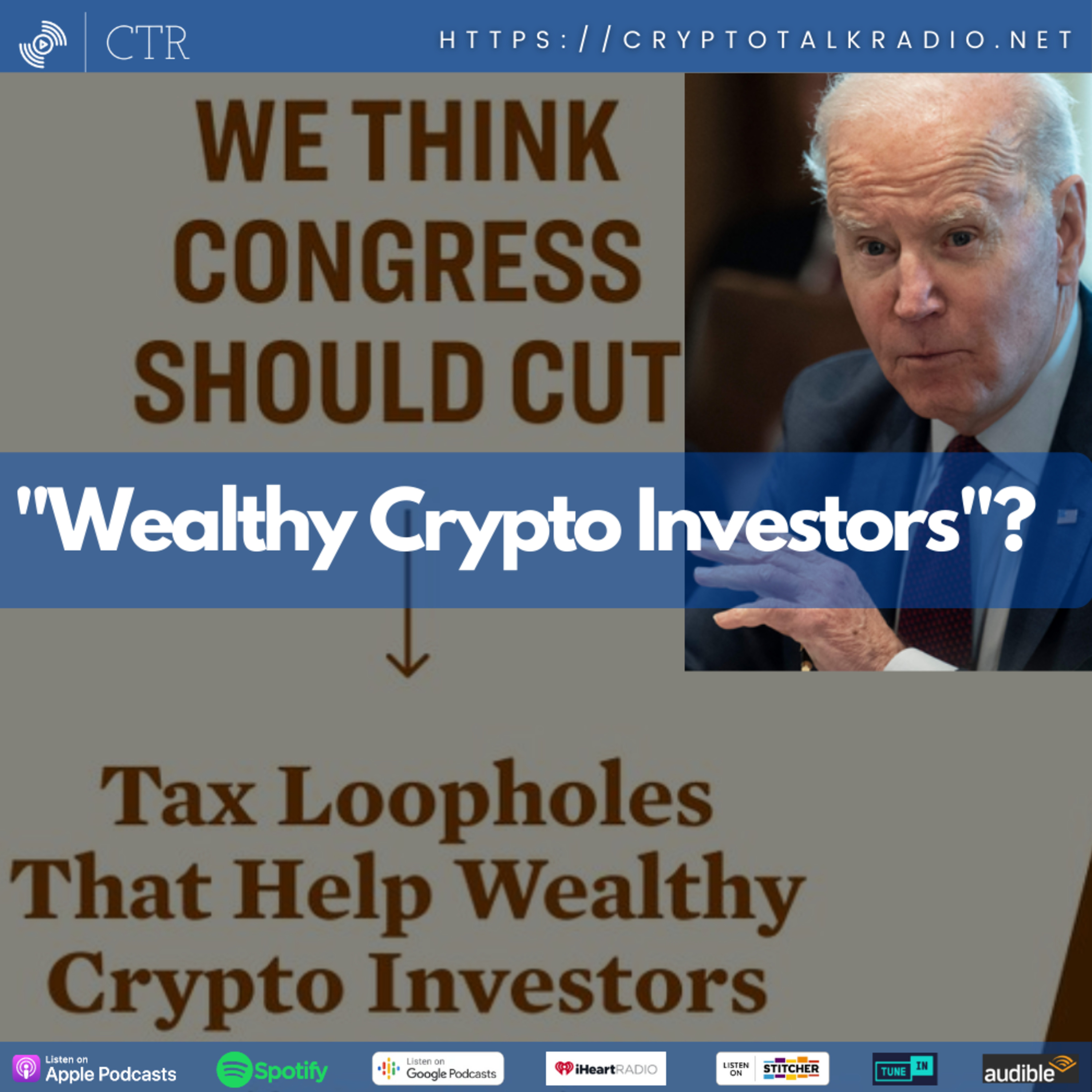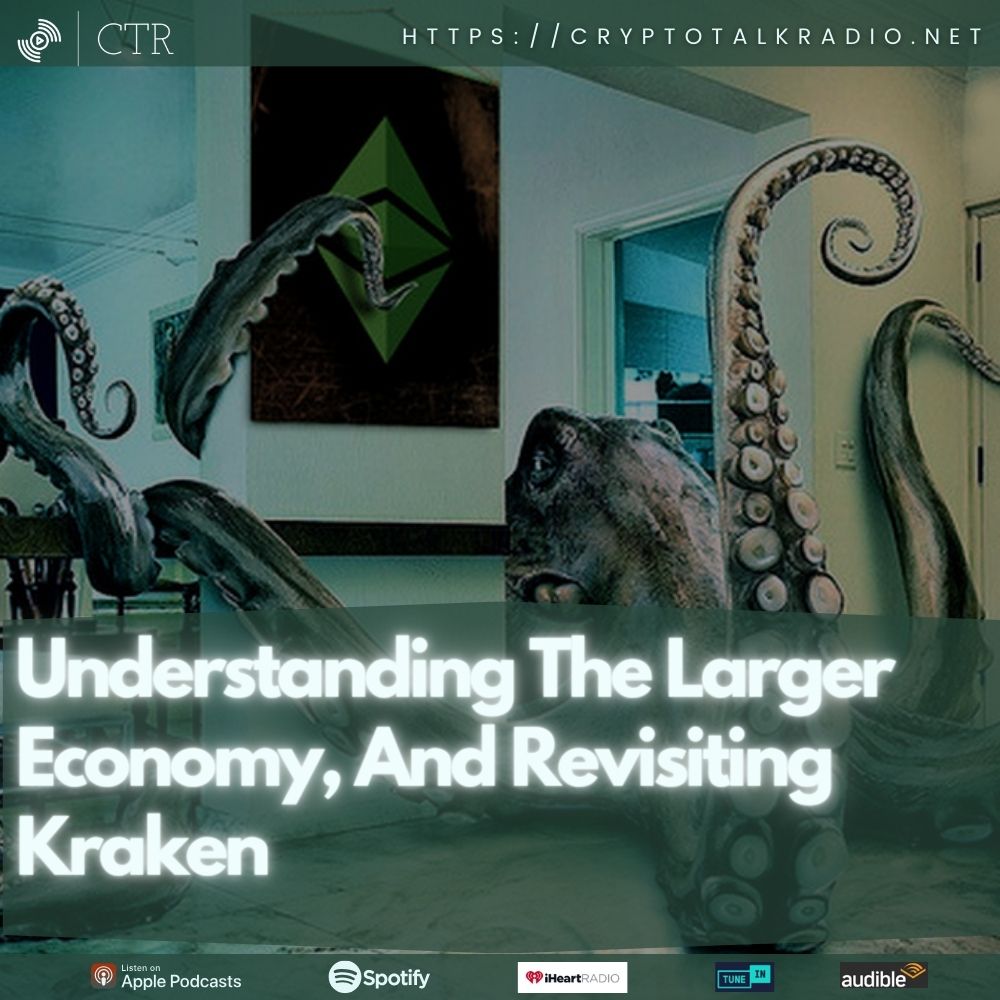Episode Transcript
[00:00:00] Hello. Good early morning, ladies and gentlemen. As the allergy season continues to run rough shod through my system, and I have a growing mountain of various used tissues at my disposal that I have to reuse.
[00:00:14] I want to do a quick update before it is lost on my mind on the news about the Bitcoin ETFs that were released available to exchanges and, and the pro shares. One was released on the New York Stock Exchange, and it's starting to skyrocket.
[00:00:32] I want to kind of talk about what it is at a high level, because some people may not really understand why it's a significant step in the right direction, but also a potential risk for crypto itself.
[00:00:49] An ETF is an exchange traded fund. It means that, again, remember, in the mainstream, outside of the bubble, in the mainstream, they still want this safety. I talked about this, this comfort and safety of regular stock exchanges.
[00:01:07] It's your fidelities, it's your Schwabs, it's your TD, Ameritrade. It's whatever they want, that comfort. They want the safety of what they know.
[00:01:17] They're not willing to jump into a different paradigm, to say, we need to reinvent this wheel, because it's no longer effective at moving us forward. They want to stay with what they've always been comfortable with. However, a bunch of rich people in a room said, although we want to keep what we have and we don't want to change what we have, we still want some of that money. I mean, at the end of the day, that's what this result means. It means that these rich folks don't want to adapt to crypto trading, don't want to wait for vast majorities of crypto to get onto those exchanges, don't want to wait for the fidelities of the world to catch up to crypto trading, or Schwab, they want to say, and even the Schwabs and the fidelities, they don't want to have to rebuild an infrastructure. Why do that when we can approve an ETF around that same crypto, but we can keep our own little bucket over here?
[00:02:21] The reason I said that there's potentially problems with this is that, remember, a lot of these, like, hedge funds folks, they're the vast majority of people who are trading in the traditional stock market. I would argue they're the vast majority of people who bought into crypto today.
[00:02:38] But the hedge funds, they've got tons of cash stacked up in these stock markets where now they're going to want to dump a lot of this money into these various funds. So that they can take advantage of the climb of these.
[00:02:55] However, anybody that understands the stock market knows that what tends to happen is they will affect the velocity of growth for a given stock or ETF or coin.
[00:03:10] If anybody remembers Marin software, if you haven't heard the name, Marin Software is probably the poster child for what I'm talking about. There's this concept called a short squeeze, and it is the reason, the primary reason that GameStop made a bunch of millionaires, that AMC has started to go up, that Marin Software has started to go up. And it's this idea that you have shares and then you basically borrow shares and lend shares. So it's transactional, two way, but you're doing it in a way that you're basically pulling money out of it. Similar to using your home as an ATM. Right. If you take out a home equity loan, a HELOC, you're doing the same thing. You own an asset and you're borrowing against it to get money out of it, and then you use that money to do something else.
[00:04:06] In these short squeezes, people have to make good on the money, they have to make good on the trade. They have to make good on the shares. You have to make everything right with the world again at some point. That's the short squeeze, is the time that you've been given to make everything right.
[00:04:21] My fear, or as I've coined, I'm afared that we're going to get to a world where we've got all these ETFs running around, around these major cryptos like a bitcoin. I don't think they'll do it for the low level ones. I think they're going to do it for the big ones that are like over $1,000.
[00:04:38] But I think you're going to see a lot of that same garbage they're talking about. No, it protects us and we were protected by law, and that's true. But I'm feared that they're going to turn these ETFs into the same thing, basically ATMs creating short squeezes.
[00:04:58] Are they good or bad? It's up for debate. The truth is they tend to harm certain stocks. GameStop was on the verge of bankruptcy because, to use a phrase, these guys were squeezing the lemon dry. They were just borrowing and borrowing and taking money out and nobody was buying in. And it was just on the verge of absolute crash failure. I'm not suggesting that GameStop is a competent business. They tend to be incompetent since they basically bought up all their competition. Any company that buys up, all their competition tends to have stabbed themselves in the back.
[00:05:34] I'm just saying that that short squeeze notion, the availability of options, all of these different things tended to have caused more harm than good in the regular stock market trades. And if that happens with these ETFs, you're going to see a similar type of disruption for the value. Well, that tends to harm people who are owning the true crypto on the back end. Now, the upside is that if you own the crypto, because they would have to figure out how to write rules that say, and they're doing it by futures. So hopefully this won't be a thing, but they have to figure out how to write the rules to where somebody who's buying ETFs cannot borrow against actual crypto holders today. If you buy the stock, somebody can borrow your stock so that they can withdraw cash and go off do something else.
[00:06:35] That should not be allowed if you're owning the actual fundamental deal.
[00:06:41] The analogy would be, if I own a home, the bank should not be able to, but they can, but they should not be able to then borrow my home, that they can withdraw equity out and do whatever, it's actually in the contract that they could if they wanted to, but they don't.
[00:06:57] If they do that with the ETFs, I guarantee it's going to be chaos. I don't know that they will. I'm saying that they shouldn't. And hopefully somebody has thought this through to restrict those types of trades to certain transactional things. Okay. All you're trading is based on the value of whichever crypto, Bitcoin, in this case, you're just trading against the value of it. And we have a pool of money and that's all we're really shifting is cash around. Absolutely. That's fine. If we're saying that whichever exchange holds X amount of said crypto, and we're trading around that pool of crypto, as long as the exchange owns it, that's fine. If we're saying that the exchange will give you some, quote, ownership of the coin, which I can't see how they wouldn't do it that way. That potentially could be problematic, depending on how they bridge the understanding to the investor.
[00:07:55] I think it's going to be the cash value deal. Because if it's similar like gold, right? If you trade gold futures, you don't own the gold, you're owning the value of said, that's perfectly okay. If they do that with Bitcoin, that's perfectly okay. And that might actually be a good thing because then it means that the crypto industry, the people who actually own the coins on the crypto side, who are brave enough to go to the crypto exchanges, they're the ones who ultimately are the governance, quote unquote, of what these guys are doing over here. And these guys can't really do much damage outside of the exchanges. I am 100% cool with that. I have no problems with that. And I think it's actually a good thing. And I would love to see, and I don't see how they could do it, but I would love to see some way to extend that to other types of tokens without the specificity of the token.
[00:08:48] In this situation, they're creating a fund around the token specifically for bitcoin strategies.
[00:08:57] That's kind of all they could do.
[00:09:00] But I wouldn't want to see thousands and thousands of funds pop up. Maybe that's the only way to do it, because if you were to invest in four hundred and one K today, that's basically how that would work.
[00:09:11] I don't know how far they'll go with it. Maybe they only care about Bitcoin because Bitcoin is the current cash cow and they see that it's skyrocketing. They want to get a piece of it. I don't know.
[00:09:24] My only concern, again, is to make sure that we don't go too far overboard and give these guys too much power to disrupt what's happening on the actual crypto side and the people own crypto. Fortunately, analysts have kind of come back and said, I don't see that this protects you any more than owning the crypto itself. I agree with this, but I also see they're just a feared that there's no regulatory clarity on crypto. We're kind of afraid to do it. We need something that gives us comfort, and if this is the best way to do that, fine. And if it benefits all people, fine.


